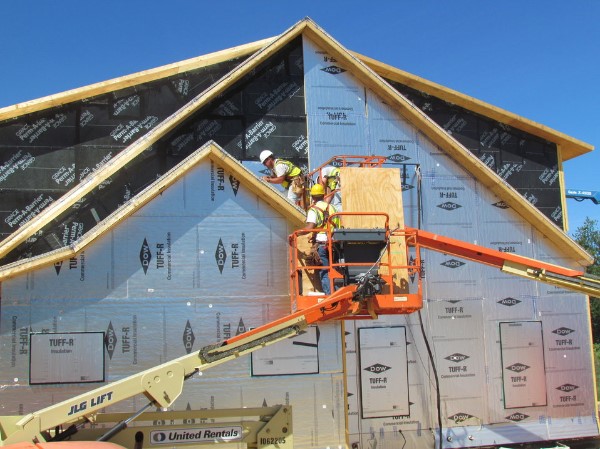What could the Green New Deal mean for housing?
By Alia Khan, Consultant
The global campaign on tackling the climate emergency has found popularity and enjoyed substantial media coverage in recent months. Local councillors and MPs are talking about it more and more, and many councils have now declared a climate emergency. But how will this issue rise-up the political agenda affect one of Britain’s other urgent political priorities – the need for more housing?
The Green New Deal advocates a radical response to what, in the aftermath of the 2008 economic crash, appeared to be the intertwined economic and climate crises. It is a ten-year action plan that reflects the scale of the climate challenge, while aiming to improve everyday life and building a fair and balanced society. It aims to improve energy, housing, and transport in a climate friendly manner.
Sections of the US Democratic Party have found inspiration in the GND, while in the UK the Labour party has committed to decarbonising Britain by 2030 as part of a transformational, socialist Green New Deal. A private members bill has also been launched by the Green party’s Caroline Lucas MP and Labour’s Clive Lewis MP.
The Green New Deal Bill outlines a ten-year plan to decarbonise the economy. Whilst much of the GND policy on housing focuses on retrofitting houses, it also requires government nationally and locally to invest in the provisions of zero carbon housing to meet social need including new council housing, with support for new housing co-operatives and other forms of ownership.
Following the publication of the United Nations’ Climate report, the Town and Country Planning Association (TCPA) called on the UK government to issue extensive planning policies on climate change, stressing the need to reduce emissions, and calling for a new department with responsibility for climate change and a new national plan to co-ordinate and guide development towards places that would be least affected by drought and rising sea levels.
Introducing the GND could result in a revised National Planning Policy Framework (NPPF) which contains ambitious policies on climate change. This would result in policy and legislation to address climate change at a local level, overcoming the planning barriers faced by many local authorities in England.
Local plans would have to demonstrate how policy contributes to the Climate Change Act target and include actions to reduce emissions over time. Annual monitoring reports would contain ongoing assessments of carbon performance. This may lead to more local authorities adopting the ‘Merton rule’ – a planning policy developed by Merton Council in 2003, which required new developments to generate at least 10% of their energy needs from on-site renewable energy equipment – to help drive energy-positive or zero-carbon development.
Regardless of whether the GND is adopted, it is increasingly important for developers and planners to be aware of their impact on climate change and consider development plans with climate mitigation fully ingrained. It may be a challenge, but if this can be achieved, they will not only help tackle the housing crisis but contribute to a reduction of carbon emissions at a time when it is high in the minds of those who will make the decision whether or not to approve a planning application – local politicians.
If you have any questions about how councillors’ concerns about climate change could affect your planning application, please give Chelgate Local a call on 020 7939 7939 or email planning@chelgate.com

Strategic land and site promotion
“Chelgate gives a real insight into political thinking at all levels and all political persuasions, …

Energy and infrastructure
From new nuclear and unconventional gas to renewables, waste and airports, our team has worked …


